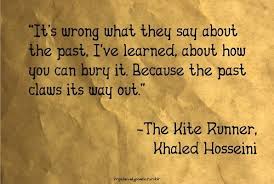I have officially finished The Alchemist! It was really good, but it wasn't quite what I was expecting. I wasn't expecting it to be so, inspiring? Or at least, trying to be inspiring. And it was quite a deal more religious than I ever expected it to be. Which was interesting to me. I liked it because it was different than what I was expecting. Here are some of the main things that stood out to me in the novel:
-Personification. SO much personification. Of the wind, the desert, the sun,
everything. In my own opinion, it wasn't too much personification, but
anymore and it might have been. It added a nice effect, and emphasized
the inspirational parts.
-Existentialism. I don't know if this is quite the right word to describe it,
but that's kind of the feeling I got. Santiago was trying to be so in tune with
everything around him, and paying so much attention to nature and the desert
and what the world was trying to tell him. It reminded me of some of Ralph
Waldo Emerson's work.
-Values and Ideals. I do believe it contains some good, important values
that need to be taught and put into action more so than they are being
currently. For example:
"It's the possibility of having a dream come true that makes life interesting."
The value in this quote, is that we all have dreams. And we should all strive to achieve them! There is nothing wrong with going after your dreams. In fact, I think there is something admirable about it. Dream big. (Being an education major, I hope to be able to instill this in my future students.)
"When we love, we always strive to become better than we are. When we strive to become better than we are, everything around us becomes better too."
With this quote, love, obviously is a big one. It's important to learn how to love, and to be loved in return. When we love, something in us changes. And when someone loves us back, even more changes. If we can learn to love, and better ourselves, then everything else will become better too.
"There is only one thing that makes a dream impossible to achieve: the fear of failure."
This is pretty similar to the first quote there, but it's a big one! We shouldn't fear failure! It reminds me of another quote, the only failure is in not trying. Go after your dreams! Even if you fail, at least you tried and learned a few things along the way.
"The secret of life, though, is to fall seven times and to get up eight times."
The Alchemist seemed to me to just reiterate a commonly held belief, that the joy is in the journey, not the destination. If Santiago hadn't of gone through all the trials and struggles he did to fulfill his "personal legend" then he wouldn't have learned and grown so much on the way. Which, I would argue, was the most important part. It wasn't in him reaching the Pyramids, although that was technically his goal. I think the point of his journey was to become the person he was meant to be by the time he arrived at the Pyramids. I would also argue that Santiago didn't realize that till pretty late on in his story.
I think this can DEFINITELY relate to all of our lives. I claim that Paulo Coelho is making a religious claim through this book, that God knows us. He is fully aware of our goals, and what we need to do to get there. And, like with Santiago, He is fully aware of who we need to be, and what we need to go through to become that person.
It would be extremely hard for me to read this book and not have some religious insights from it. Of course, that could be simply because I'm a religious person. But I do believe that that is one claim Coelho is making with this book.
I'm still curious as to why this book did not succeed when first published. I need to research it still. It could just be the timing, but I'm curious.
Overall, I'm grateful I read the book. It was inspiring, if nothing else. I hope to be able to go after my dreams as much as Santiago did. I also hope to be as in tune with my surroundings as he is.
And to finish off The Alchemist...










